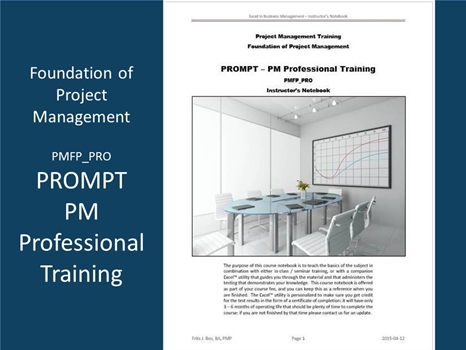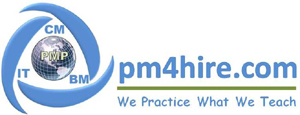
PROMPT (Project Management Pro Training) PMFP_PRO
This course provides a highly theoretical foundation from a management science perspective, which we used to create the many tools and techniques documented in this catalog. We highly recommend that you first develop the foundation knowledge for project management and ideally to obtain your PMP as a prerequisite so that you will not overanalyze the PMP exam once you have taken PROMPT. The goal of this course is not exactly “how to”, but focused on “why” we do things in a certain way across different industries. This course presents advanced concepts in project management with a PMBoK™ derived tutorial and fundamental principles that apply to any kind of project management system. Our goal is to cover projects in CM Construction Management, BM Business Management, and IT Information Technology projects or process improvement initiatives, and to master concepts defined in the PMI-PMBoK™ standard used for project management world-wide.
Project management is the art of balancing all of planning, organizing, securing, managing, leading, and controlling resources to achieve specific goals: based on techniques collated by Project Management Institute as a Project Management Body of Knowledge (PMBoK™). PMBoK™ defines a project as a temporary endeavor, with a defined beginning and end (usually time-constrained, and often constrained by funding or deliverables), undertaken to meet unique goals and objectives, typically to bring about beneficial change or added value. Temporary nature makes it different from on-going business operations (business as usual operations): repetitive, or permanent, functional activities to produce products or deliver services, even for complex projects that may take years to be completed and that seem to take on a semi-permanent functional delivery process, yet still are project based.
Prerequisites: because this course goes deep into the theory of project management it may conflict with learning for the PMP exam. The reason is that we cover many different aspects of project management not in scope for the PMBoK™, which can create confusion when you take the exam.
- Foundation for Project Management Professional, PMP training courses should be used to study for the PMP exam, which is based on a literal interpretation of PMBoK™, and you do not want to be confused with different options that are reflective of “real world” projects. That is not a reflection on PMBoK™ - it represents the reality that, to administer a definitive test, there has to be a preferred option that will be the correct answer on the professional exam.
- Project Management Professional (PMP™) designation is what makes you marketable, not the fact of having explored project management subjects on a broader scale. Without the PMP designation it can be difficult to be considered for a senior project management position. Once you have the designation, further study will enhance your knowledge and abilities, and it will provide the PDUs that you need to accumulate to keep your designation in good standing.
This course provides a highly theoretical foundation from a management science perspective, which we used to create the many tools and techniques documented in this catalog. We highly recommend that you first develop the foundation knowledge for project management and ideally to obtain your PMP as a prerequisite so that you will not overanalyze the PMP exam once you have taken PROMPT. The goal of this course is not exactly “how to”, but focused on “why” we do things in a certain way across different industries.
The first part of this course reviews the basic concepts and PMBoK™ knowledge areas used in business projects and IT projects, and highlights unique aspects of construction projects that will be explained in detail in a later part of this course. This provides the context for the materials that make up the balance of this course. The course is not based only on the PMBoK™ standards – we also include PRINCE2™ and other methodology to present a more comprehensive view of how projects emerge and must be managed in order to achieve the desired results.
The intent of this background is to highlight the different perspectives that exist in project management – rather than to argue about which is a better methodology we encourage you to consider the potential for using different solutions that best serve your project. A small IT project is not like a major construction initiative, and we would not expect to accept a “one approach fits all” solution that might come across as flimsy for that major construction project and overkill for a small IT project.
The second part of the course outlines the necessary pre-planning required long before a project ever gets initiated. This is part of the scope of PRINCE2™ (that is not covered in PMBoK™) that delves into the detailed requirements elicitation. It is important to know requirements up-front, to have a good handle on the potential costs of a project, even though we know that between planning and initiating many details can change. For many projects the odds of success are compromised by a lack of planning and an insufficient understanding of what the project is about before the company commits to undertaking the work in question.
This planning process also looks into the portfolio and prioritization process required for undertaking multiple projects under constraints of resources, financing, and strategic prioritization. With the up-front detail in hand we can provide better estimates of the anticipated costs and the potential benefits of taking on the project. With a strong portfolio we can rank the backlog of potential projects to maximize the value to the client (taking into account projects that must be done for legal reasons as well). This is based on a detailed business case for each potential project that is used to then commit to the work when the project is added to backlog, until the work can actually be initiated.
The third part of the course is focused on initiating the project work if it is selected in the portfolio and prioritization process. One of the first steps is to update project financials (depending on how long the work has resided in backlog) to make sure the business case is still solid. This is very important in construction where the cost of labour and materials escalate rather quickly. Only after we can confirm the economics and feasibility of the initiative under current conditions should a project be chartered.
A key stage is the detailed project planning and structuring a team to look after the implementation, identifying what needs to be procured, as well as drafting an implementation schedule. From the start we need a management plan and change control process, as well as guidelines for all the project documentation to be created and maintained. Experience has shown that without proactive effort documentation simply does not get created. Only when the planning is completed do we move forward.
The fourth part of the course is focused on executing the project work that tends to get most of the attention in how to manage projects. There are several methodologies that ignore everything except execution, but we do not see that as a beneficial option except for minor undertakings. In this part we focus on Information Technology projects – construction is explained as a separate focus area and business projects tend to appear as a subset of (enabling) IT projects. We step through many “gates” in the process and discuss alternative options for streamlining that process if at all possible. We pay particular attention to quality assurance work effort.
The fifth part of the course is focused on the unique requirements for managing construction projects. There is no denying that construction is subject to greater risk than business- or information technology projects. It is understandable, therefore, that both clients and contractors want to implement provisions that protect them from risk events. It is important to have a firm grasp of the risk factors when you bid on a project, to have provisions in the statement of work, and to implement tools that enable you to minimize risk exposure in a project. Construction safety is a major concern that must be addressed in the overall planning of projects and its impact on the cost of completing projects.
The sixth part of the course deals with “Client Centric Projects” that in the industry are referred to as IPD™ (Integrated Project Delivery) projects. Unfortunately, the trademarked process does not allow room for change as proposed in this course – while IPD is focused on General Contractors, CCPM has a far more generic application in project management of any kind (including work managed by General Contractors). We review the origins of TPS (Toyota Production System and Materials Management), as well as the GC contract management process (IPD compared to PMBoK™ traditional project delivery) and advances in technology like BIM (Building Information Modeling) that influence construction management.
The final part of the course is focused on the facilitation skills needed to manage a team in order to gain the highest productivity. As highlighted in this course, there are many points of view on how to best do things. In the PMBoK™ there is a clear admonition that methodology is used only to establish a common understanding and approach: you do not constrain a program by the methodology, and you adapt the approach to suit your project (not the other way around). Team skills are important in dealing with project stakeholders, to minimize discord and improve collaboration among different (sub-)contractors to a project. In this last part we review methods and techniques you can use to more effectively manage people in order to deliver your projects on time and within budget.
Learning Formats PMFP_PRO
This course is currently available in a classroom setting (public or company private) with approximately 45 contact hours plus self-study.
PDF – Certificate Of Completion
Each course offers a certificate of completion that identifies the course, the student, and a brief description of the course. To receive a certificate the student must have attended at least 80% of the course sessions. This personalized certificate is forwarded to the student by Email.
PDF – Course Notebook
Each course includes a notebook in PDF format that provides the minimum knowledge the student must master in order to obtain the certificate. In the notebook you will find references to other study materials. Students receive the notebook by Email when their registration is confirmed.
PDF – Program Overview
An overview of this study program can be downloaded from the website by right-clicking on the program link on the enquiry page.
PDF – Current Training Schedule
A list of upcoming training sessions can be downloaded from the website by right-clicking on the schedule link on the enquiry page.
Registration – Service Providers
To register for any training course please look on the enquiry link page of your service provider (from where you accessed this website). On the page you will find a registration request form where you can order the course that you are interested in. The availability dates will be provided to you, along with payment instructions if you decide to go ahead.

 |
|